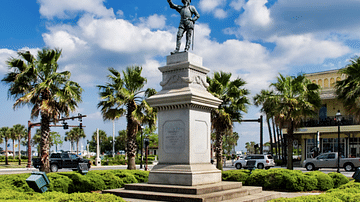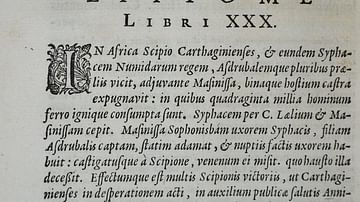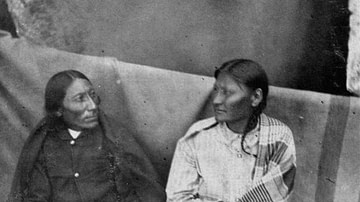Search
Did you mean: Augustus?
Search Results

Article
Boethius: First of the Medievals?
Anicius Manlius Severinus Boethius (c. 477-524/525) was a scholar in Late Antiquity who was imprisoned and executed by Theodoric (r. 493-526 CE) but was later idolised by medieval intellectuals. His most famous work was De consolatione philosophiae...

Image
Statue of Juan Ponce de León
A modern statue of Juan Ponce de León (c. 1460-1521) in St. Augustine, Florida. Ponce de León was a conquistador who became the first governor of Puerto Rico and, landing in Florida on an expedition of exploration, gave the region that name...

Image
Livy's Roman History, 1664
Historiarum ab Urbe Condita. - The complete history of Rome and its Urban Foundation -from its foundation to Augustine- by Titus Livius Patavina (59 BC – AD 17). Latin text. Edited with extensive commentary by Joannes Frederick Gronovius...

Image
Young George Washington with His Father
Father, I cannot tell a lie: I cut the tree, showing George Washington as a young with his father Augustine 'Gus' Washington (1694-1743), a Virginian planter, engraving by John C. McRae after a painting by G.G. White, c. 1867. Library of...

Image
Mochi: Cheyenne Who Survived Sand Creek Massacre and Became a Warrior
Cheyenne warrior Mochi ("Buffalo Calf", l. c. 1841-1881), pictured on the right, took up arms against US government forces after surviving the Sand Creek Massacre of 29 November 1864. Prior to the massacre, she was among those seeking peaceful...

Video
The Challenge of Gnosticism (Part 2)
Origins of Christianity Lecture Series http://www.ou.edu/content/cte/teaching/articles/origins-of-christianity.html The Origins of Christianity Lecture Series explores the history of Christianity from Jesus to Augustine. The series...

Video
The Challenge of Gnosticism (Part 1)
Origins of Christianity Lecture Series http://www.ou.edu/content/cte/teaching/articles/origins-of-christianity.html The Origins of Christianity Lecture Series explores the history of Christianity from Jesus to Augustine. The series aims...

Definition
Martin Luther
Martin Luther (l. 1483-1546) was a German priest, monk, and theologian who became the central figure of the religious and cultural movement known as the Protestant Reformation. Even though earlier reformers had expressed Luther's views, his...

Definition
Christianity
Christianity is the world's largest religion, with 2.8 billion adherents. It is categorized as one of the three Abrahamic or monotheistic religions of the Western tradition along with Judaism and Islam. 'Christian' is derived from the Greek...

Definition
The Saxons
The Saxons were a Germanic people of the region north of the Elbe River stretching from Holstein (in modern-day Germany) to the North Sea. The Saxons who migrated to Britain in the 5th and 6th centuries CE along with the Angles, Frisians...